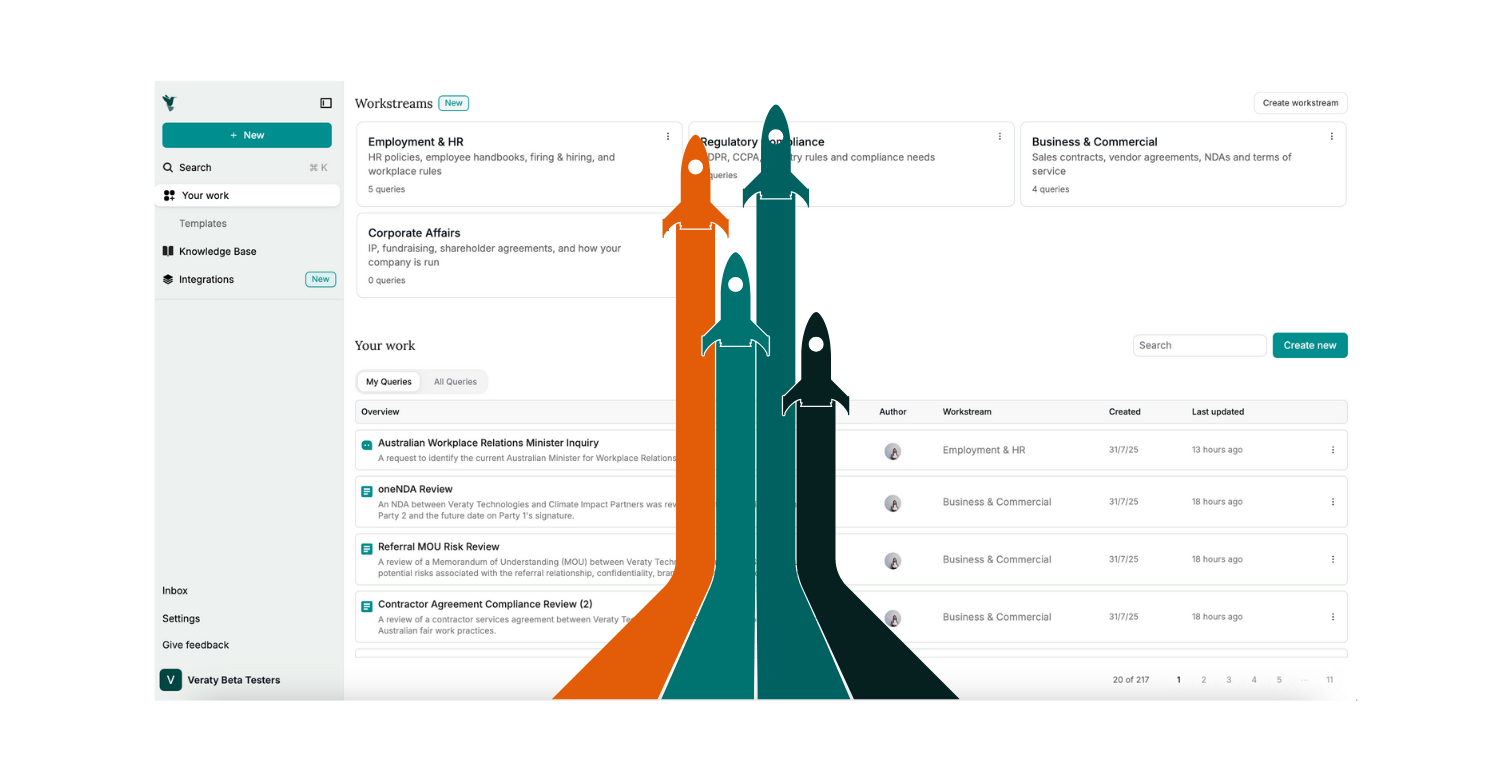Legal AI is only as good as its inputs: Why knowledge management matters

AI is transforming legal work. From drafting contracts to reviewing compliance questionnaires, tasks that once took hours now take seconds.
But there’s one thing even the most advanced legal AI can’t do well on its own: understand your business.
Most legal tools—and many AI platforms—focus on output. How fast can you generate a document? How well can you redline a contract? But speed means little if the inputs are wrong, incomplete, or inconsistent. In legal, context isn’t optional—it’s everything.
That’s why we’ve built Veraty around a different principle: great legal work starts with great inputs—and those come from strong knowledge management.
Legal Work Starts with Context, Not Templates
Behind every legal task are questions like:
- What’s the purpose of this deal?
- What’s the business model?
- What does our platform actually do with user data?
- What risks have we accepted in past negotiations?
These are not questions a generic template—or even a powerful AI—will ask or answer. And without the right inputs, the outputs may be technically correct, but contextually wrong.
A contract sent to a client with outdated terms or missing clauses. A data privacy policy that doesn’t reflect how your platform actually works. A vendor questionnaire response that contradicts your previous answers.
Legal accuracy isn’t just about language. It’s about alignment—with your systems, your contracts, your risk appetite, and your operational reality.
Why Inputs Are So Hard for Non-Legal Teams
Most legal platforms—and general AI tools like ChatGPT—rely on users to provide accurate, complete context. But if you're not a lawyer, that’s difficult.
- How do you know which terms even apply?
- What counts as a material risk?
- What needs to be disclosed—and what doesn’t?
Even simple tasks like generating a contract or filling out a compliance form can go wrong if the inputs are incomplete or misunderstood. And unlike human lawyers, generic tools won’t catch what’s missing.
The result? Documents that sound correct but miss critical context—leading to rework, delays, or exposure down the line.
Veraty: Built to Understand Your Business
At Veraty, we’ve flipped the model.
Instead of asking users to feed the system everything up front, we help teams build a living legal knowledge base as they go:
- Company details (entity structure, policies, jurisdictions)
- Business model facts (data practices, service levels, partnerships)
- Legal positions (risk thresholds, standard clauses, past exceptions)
- Regulatory obligations (privacy, employment, corporate compliance)
This information becomes a unified legal data foundation that’s accessible to our AI agents—so each document, policy, or workflow is based on accurate, up-to-date context.
The result:
✅ Consistent answers across your team
✅ Faster document creation with fewer edits
✅ Reduced legal risk from incomplete or outdated information
And importantly, it doesn’t require you to be a lawyer to maintain it. Veraty handles the orchestration—so your legal knowledge stays organised, versioned, and ready to use.
Legal AI Should Learn Your Business—Not Just the Law
There’s no shortage of tools that can generate legal text. But few are built to understand what makes that text relevant or defensible for your business.
At Veraty, we believe legal AI should mirror what great in-house lawyers do: understand the business first, then deliver advice and outputs you can trust.
Start with Better Inputs. Get Better Outcomes.
If your team is struggling to find or provide the right context to compliance questions, policies, or risk assessments, it’s time for a better foundation.
👉 Try Veraty for free and see how smarter inputs lead to stronger legal outcomes.

.avif)

.png)
.png)
.svg)